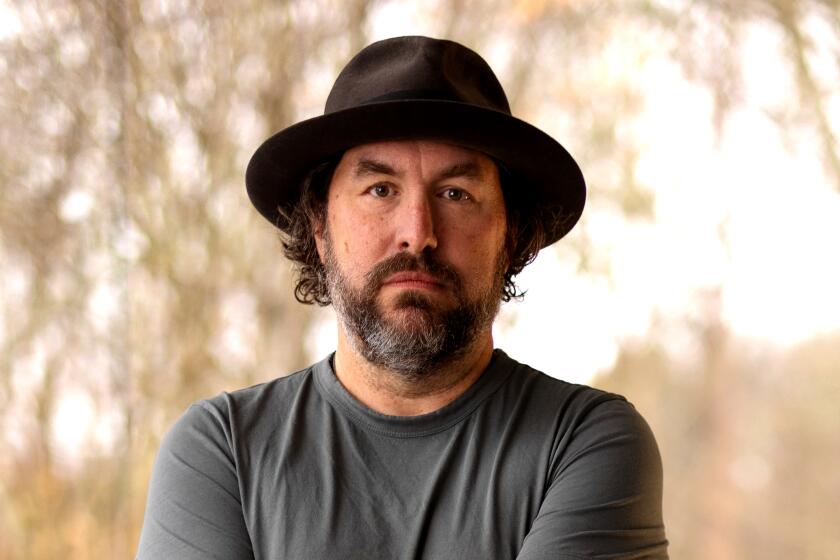The best place to hide a body? Just ask writer Tod Goldberg
In Tod Goldberg’s new novel, “Gangsterland” (Counterpoint: 420 pp., $26), a Mafia hitman named Sal Cupertine makes an uncharacteristic mistake and kills three federal agents in a Chicago hotel. The local mob leaders decide to spare his life and send him to Las Vegas, where he undergoes plastic surgery and assumes the identity of David Cohen, a rabbi overseeing a cemetery in the suburb of Summerlin.
Goldberg, director of the low-residency MFA in creative writing program at UC Riverside’s Palm Desert Center, has written novels (“Fake Liar Cheat,” “Living Dead Girl”) and short-story collections (“Simplify,” “Other Resort Cities”). Goldberg, a fixture of the Southern California literary scene for years, lives in La Quinta with his wife and their “caterwauling” cocker spaniels. I spoke with Goldberg by phone from his office in Palm Desert.
Your book’s about a Mafia hit man who goes into hiding as a rabbi, which is obviously unusual. How did that idea come to you?
It came out of a short story I wrote called “Mitzvah” that was originally in [the anthology] “Las Vegas Noir.” I was asked by the editors of the anthology, “Would you write something about Summerlin?,” which is where I lived briefly in the late 1990s. And I was like, “What dark, sad, screwed-up story can I write about this bucolic, master-planned suburbia?”
One of my obsessions is figuring out how to kill people and get away with it. [Laughs.] I was driving in Palm Springs [by] this old Native American cemetery, and I thought, “Man, if you really want to get away with murder, the thing to do is kill someone, put them in a coffin and bury them in a cemetery.” And then I thought, “Jews don’t embalm, and they put someone immediately into a pine box. That’s the way to do it, because then all the evidence will be gone.” So that was the genesis moment.
And I thought about how someone could hide out as a rabbi.... Both my parents had died, and I was just sort of having that thing that I guess you call a midlife crisis. [Laughs.] I really just wanted to see the evolution of someone having a spiritual awakening, having religion cause them to basically create new neural pathways of logic, and start examining their own lives and their own decisions.
You obviously did a lot of research into the Talmud and Torah for the book. Were you raised in a religious household?
Not at all, really. I wasn’t even bar mitzvahed. But you can’t grow up a Jew and not know that you’re a Jew. I was aware of the things my family had struggled through. My grandfather was smuggled out of Ukraine in the early 1900s, with a bag of potatoes and his dying brother next to him, and moved to Walla Walla, Wash., where he was beaten up every day for being a Jew. And then he became this huge community leader. He would always say that the greatest thing that ever happened to him was that as he grew older, people that were terrible to him as a child came to him when they needed help, and he helped them.
That’s amazing.
It’s a great life lesson.... After I read all these books, and once I started looking into the religion, you know, I think I’m more spiritual now than when I started to write this book.
I laughed out loud so much reading this book, and sometimes what I’d be laughing at was on the same page as this graphic description of a murder. Was it difficult to write like that?
I knew I wanted it to be a mordantly funny book, but I also knew I wanted to deal with serious issues, and to strike that balance was hard, because if you do either one poorly, the other one feels gratuitous.
I also have this opinion, generally, of crime fiction — these books or movies where there’s just 8,000 dead bodies, I just feel like it’s a disrespect to the idea of human life, that there’s not ramifications, that there aren’t people who loved that person who died. So in “Gangsterland,” I wanted to make sure that when someone died, they had a purpose.... If I’m going to show a hit man, I don’t want it to be glamorous. I want it to be, you know, half his face all over the place. I want it to be gross, because part of what I’m hopefully achieving by writing about it is demystifying the coolness of being a hit man. It’s a dirty job.
It’s great to see the portrayal of these characters as real people and not just plot points.
Yeah, and I think probably that comes from my writing-sad-short stories background. I’m trying to mix what I love about literary fiction with what I love about crime fiction. And what I sometimes find silly about crime fiction is that lack of regard for human life. I’m still writing commercial fiction with this novel, and I’m aware of that — that was a choice that I specifically made. But I feel like I can do the things I want to do emotionally, and be invested in the characters, and still make it fun, and something you can read by the pool. That was sort of my hope.
Schaub is a writer who lives in Austin, Texas.
More to Read
Sign up for our Book Club newsletter
Get the latest news, events and more from the Los Angeles Times Book Club, and help us get L.A. reading and talking.
You may occasionally receive promotional content from the Los Angeles Times.









